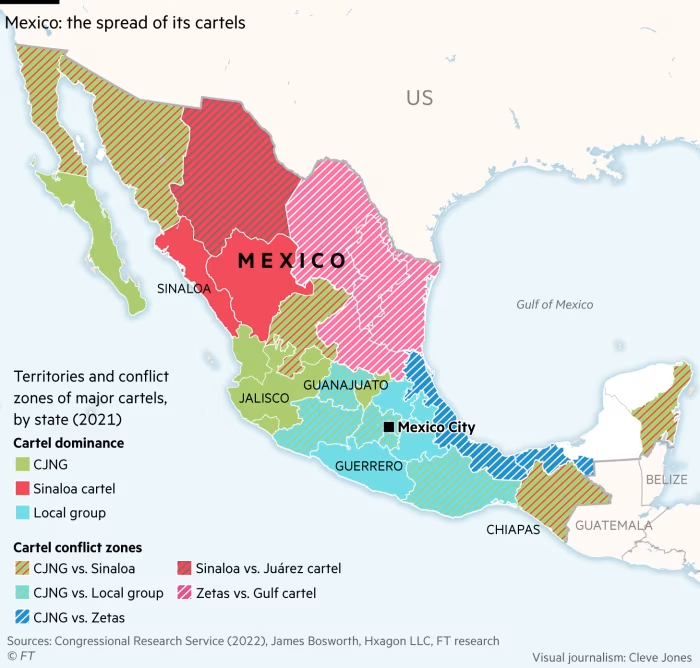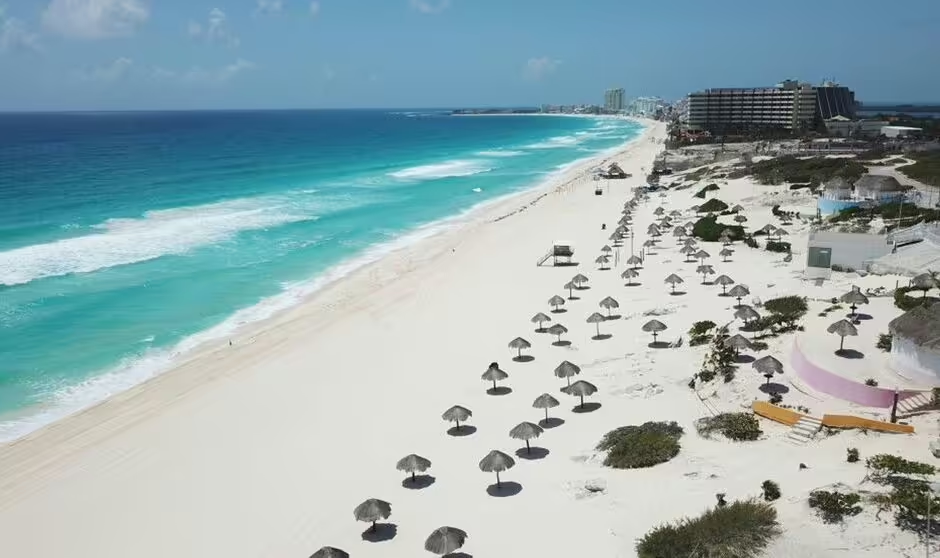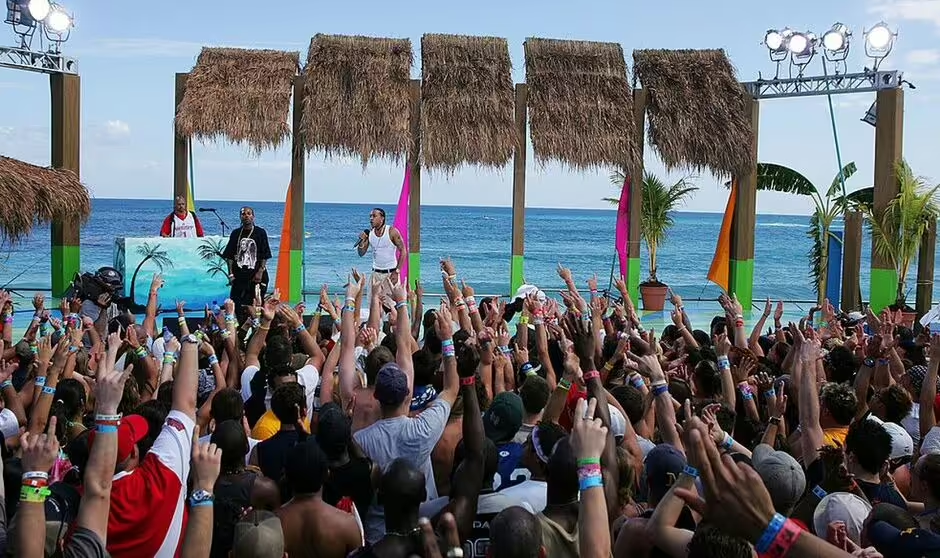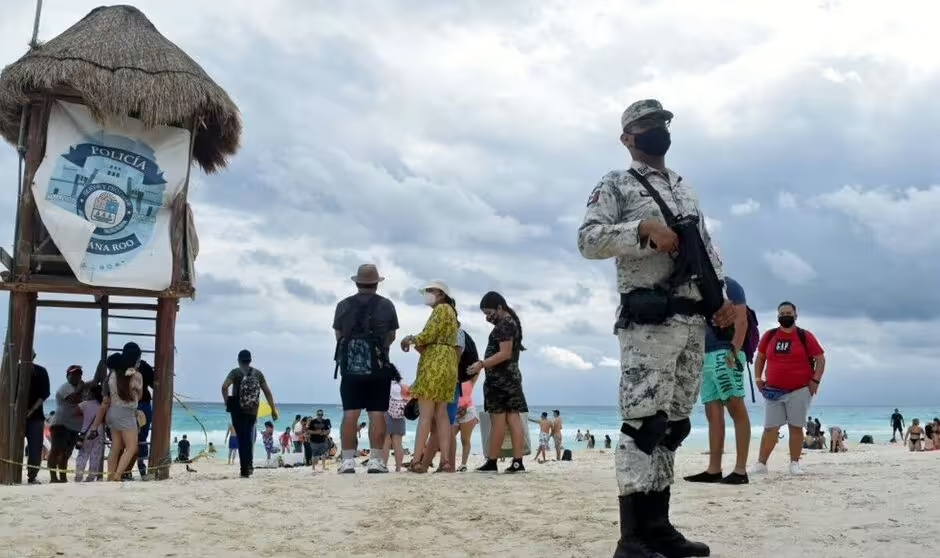Mexico’s drug cartels are thriving
Mexico’s drug cartels are thriving as the outgoing president said he would tackle gangs with ‘hugs not bullets.’ Five years on, violence is worse than ever
The Express • June 8, 2024 // Financial Times
Mexico attracts millions of visitors a year, despite its reputation for violence and drug cartels. Some 66 million people headed to the Central American country last year, most making their way to one of the beach resorts in Quintana Roo state.
But behind the scenic front, a different picture emerges.
When a group of strangers turned up uninvited at a Christmas party in a bucolic colonial-era courtyard in Salvatierra, central Mexico, last year, the assembled revellers asked them to leave.
Shortly afterwards, as the young partygoers danced to live music, the gatecrashers returned with armed gunmen and the order: “Kill them all.” Using automatic weapons, the assassins sprayed the revellers with 195 bullets as they attempted to flee, according to investigators. Eleven dead bodies were recovered from the bloodstained courtyard and 14 people were injured.
Even in a country weary of extreme violence, the massacre of unarmed partygoers in Guanajuato state had the power to shock. Despite national outrage, it took two months for the authorities to arrest anyone. When they did, they detained two people accused of firing the shots but not those who ordered the killing.
Organised crime and violence are hardly new to Mexico. The country’s first cocaine cartel formed in the early 1980s. A quarter of a century later, conservative President Felipe Calderón launched an all-out “war on drugs,” plunging the country into a bloodbath.
But Mexico’s organised crime problem has worsened dramatically during the five and a half years of populist leftwinger Andrés Manuel López Obrador’s presidency, security experts say, and has become so serious that it threatens the country’s future. Polls show that security is a top voter concern ahead of the presidential election on June 2.
For more than a decade, the dominant drug groups have been fragmenting, generating a host of smaller splinter gangs who fight over turf. Today, the two largest and most powerful cartels, the Sinaloa cartel and the Jalisco New Generation cartel (CJNG), are jostling with smaller rivals such as the Viagras, the Squirrels and the Scorpions.
Many of the cartels have expanded into lucrative new businesses. In a 2024 report, the US Drug Enforcement Administration called the Sinaloa and Jalisco cartels “transnational criminal organisations” because they are “involved in arms trafficking, money laundering, migrant smuggling, sex trafficking, bribery, extortion, and a host of other crimes.” The cartels control more territory than ever before, about a third of the country according to one estimate from the US military.
“There’s been an exponential deterioration,” says Manuel Clouthier, a former state deputy and businessman in the northwestern state of Sinaloa, which is home to the eponymous drug cartel. “Mexico is becoming a failed state.”
As the cartels’ economic power has grown, so has their international reach. Mexico’s two top cartels now run a network of illegal activities stretching across South America that is challenging governments and alarming citizens. Battles between local affiliates of the CJNG and the Sinaloa cartel have turned previously peaceful Ecuador into one of the world’s most violent countries.
The cartels source chemicals needed to make synthetic drugs such as fentanyl from China and India and have strong connections to European mafia such as the Italian ’Ndrangheta, investigators say. Anne Milgram, head of the DEA, told a US Senate committee in February last year that “the Jalisco cartel has influence through associates, facilitators and brokers on every continent except Antarctica.”
In the US, Mexico’s deteriorating security and flourishing drug trade have become an election issue, with Republicans calling for a tougher line. Some in the party have gone as far as calling for US military forces to nab cartel leaders in Osama bin Laden-style commando operations.
While official statistics on crimes such as murder are questioned by independent researchers, experts agree that the power of organised crime now represents a serious risk not only to the population but to business and the economy. It is one of the reasons, experts say, why the country is failing to capitalise fully on its potential to draw manufacturing away from China.
A Mexican business leader, speaking off the record because of the sensitivity of the subject, says security has deteriorated dramatically under López Obrador and that the government has played down the problem. “Nobody is talking about drug trafficking or fuel theft,” he says.
The president has painted a picture of an administration doing all it can to tackle the problem, while blaming his predecessors for creating it. He has so far avoided paying a serious political price for the deterioration. His approval rating remains at 65 per cent, according to poll aggregator Oraculus, and has barely changed in the past three years.“
The [government has] been above all trying to control the narrative,” says Falko Ernst, senior Mexico analyst at Crisis Group. “Security policy has been watered down to a PR exercise for electoral purposes.”
In reality, he adds, López Obrador’s policies have allowed criminals to continue “getting a much stronger, much more direct and much more aggressive foothold within institutions.”
Officially, security is a top priority for López Obrador. Each weekday at 6am the president chairs a security cabinet with military and police chiefs and key ministers. Twice a month his security team presents a “zero impunity” report with a blizzard of statistics covering everything from arrests to the exact number of security forces and vehicles deployed.
“Nowhere in the world is there a security cabinet where the [president] heads up daily tasks,” said Rosa Icela Rodríguez Velázquez, Mexico’s security minister, at the April 30 security briefing. Since taking office, she added, the president had presided over 1,353 security council meetings and not missed a single one.
At the start of his administration, López Obrador set out a new strategy which he called “hugs not bullets.” The idea was to tackle the root causes of crime, replace the federal police force with a new military-run National Guard and to minimise bloodshed by avoiding direct confrontation with the cartels. Instead, he appealed to cartel members to “think of their mothers.”
López Obrador intended his more peaceful approach as an alternative to Calderón’s 2006-2012 “war” and to his immediate predecessor Enrique Peña Nieto’s strategy, which had failed to contain rising murder rates.
But the president drew fierce criticism for greeting personally the mother of jailed Sinaloa cartel boss Joaquín “El Chapo” Guzmán in 2020 — something he said was a humanitarian gesture towards a woman then in her nineties.
Eduardo Guerrero, a security expert at Lantia Consultores, says López Obrador’s policy of hugs not bullets “had the . . . undesired effect of expanding the geographical presence of organised crime to new areas, precisely because the army wasn’t confronting criminals.”
Criminal groups are also interfering more brazenly in elections. This year’s campaign, which includes races for federal and state congresses, governorships and mayoralties, has been the deadliest ever. So far 36 candidates and another 45 people linked to the election have been murdered, 15 more kidnapped and dozens of others threatened, according to think-tank Laboratorio Electoral.
Another key battleground is official statistics. López Obrador’s six-year term will be Mexico’s most violent ever in terms of total murders, with more than 175,000 killed so far. But the president has seized on figures showing a small reduction in homicides in the last three years from a record level in 2020.
Experts point out that the murder figures do not include the record number of people reported as missing, almost 115,000 by last year, 43,000 of whom disappeared during López Obrador’s presidency. They also note that the proportion of “crimes against life” reported as manslaughter or “other crimes” has been rising as murders fall, suggesting homicides are being reclassified.
At the start of López Obrador’s presidency in 2018, 57 per cent of Mexico’s violent deaths were marked as homicides. By the first four months of 2023, murders had fallen to 46 per cent of the total, according to analysis of the data by Nexos.
“The figures aren’t totally reliable. Nobody audits the figures,” says Edna Jaime, dean of the school of social sciences and government at the Tecnológico de Monterrey. “Past administrations did try to improve the quality of the information . . . that was all abandoned in this administration.”
Police and doctors conducting autopsies are sometimes under pressure, critics say, to avoid reporting the cause of death on certificates as murder. “If it’s not a homicide, it’s less paperwork,” says Ernst of Crisis Group. “Basically, like, 10 bullet holes and it’s going to be ‘heart failure’.”
At the same time municipal police in many parts of Mexico are on the payroll of or forced to work for cartels, security experts say.
Claudia Sheinbaum
López Obrador’s chosen successor, ruling party Morena’s candidate Claudia Sheinbaum, experienced Mexico’s security problems first hand last month when a group of hooded men halted her convoy in the municipality of Motozintla in southern Chiapas state.
The men, who were unarmed, demanded she not forget the area when in power. Rival drug cartels are battling for turf in Chiapas but López Obrador dismissed the interception as “staged” by media critical of the government and Sheinbaum has alluded to something similar, saying the encounter was “strange.”
If elected, Sheinbaum would broadly continue López Obrador’s strategy of avoiding direct confrontation with the cartels, while incorporating elements of the strategy she employed as mayor of Mexico City, running programmes for youths to keep them off the streets and boosting investigative capability. She will continue López Obrador’s policy of relying on a military-run National Guard.
“Every year we are going to reduce crime,” she says. “We can’t give percentages over the next six years . . . [but] we are sure that this strategy is going to work.”
Many analysts are not convinced, pointing out that Sheinbaum’s academic background and upbringing in a middle-class Mexico City suburb have not prepared her to deal with brutal cartel wars.
“She still has to prove that she understands how fragile the situation is,” says Salvador Camarena, a columnist with El Financiero newspaper. “Her tours of the country have been inside a [security] bubble. I don’t think they’ve allowed her to go into the complexity of what Mexicans face.”
Sheinbaum rejects the criticism, telling the Financial Times that past wars on drugs fought in Mexico “mean a licence for the armed forces and other law and order forces in our country to kill, and we don’t believe in a licence to kill, we believe in justice.”
Xóchitl Gálvez, the main opposition candidate in next month’s election, has quoted the US military estimate that about a third of Mexico’s territory is under the control of organised crime and pledged to confront cartels head-on. “There are areas of the country where only criminals can enter and that has to stop,” she told reporters.
The two candidates clashed over security in a debate on May 19. Sheinbaum criticised the war on drugs as “one of the most terrible decisions” in recent Mexican history and defended the security record of her mentor, while Gálvez said the government’s strategy was to “give the country to organised crime.”
The situation in some areas is so bad that citizens have taken matters into their own hands.
In January, a video shared on social media showed a group of masked women from the Wixárika ethnic group in Jalisco state appealing directly to one of the country’s most powerful cartel bosses, CJNG leader “El Mencho”, for protection, rather than going to the police.
In the strife-torn Pacific coast state of Guerrero, four Catholic bishops sat down with drug cartel leaders in February without the government to negotiate a carve-up of territory with the aim of reducing violence. Salvador Rangel, an emeritus bishop, told local media that the church acted because “the state government doesn’t want to find a solution.”
Given how bad the situation has become, many question whether Mexico’s next leader will be able to make much of a difference.
The next president “will have to start from below zero,” says Guillermo Valdés, the former head of intelligence agency Cisen under Calderón. “Criminals are more powerful, there is more violence, there is more political control of territory and of the authorities . . . the task will be tremendous.”





